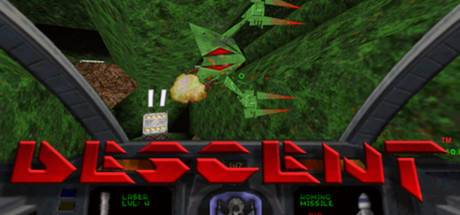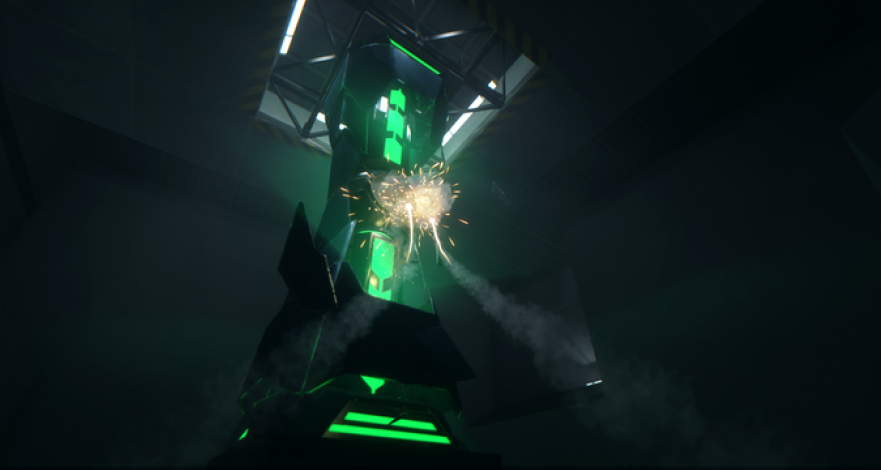Put yourself into the shoes of any North American videogamer in 1995. When you weren’t getting atomic wedgies from jocks or being laughed at by your crushes, you were thinking of one thing only: Descent, an innovative space shooter with six degrees of freedom (6DoF) and the first ever 3D textured environments in a game. It looked great, it played great, and it was a whole lot of fun. Developed by Parallax Software in Champaign, Descent was —and still is — an immersive experience so realistic that it even causes motion sickness in some players.
Though Parallax Software technically split into two companies, in true Blues Brothers fashion, “the band’s back together” to make a new 6DoF shooter (in a universe and timeline different from but similar to Descent’s), a game called Overload. The Overload team currently seeks funding on Kickstarter. I spoke with Mike Kulas, one of the founders of Parallax Software and a member of the Overload team (which is called Revival Productions).
“Our main goal is to make a great 6DoF shooter. We have strong ideas on how to do that and what key features will make it successful,” Kulas said.
When working on Descent back in 1993, this same team had pushed the boundaries of what was possible on the primitive systems (compared to today’s standards) they had available and made decisions that naturally lead to gameplay being more fun and dynamic.

For example, Descent introduced to videogaming the now-commonplace feature of being able to join a multiplayer match that was already in session (“late join”) instead of having to sit idly, waiting for all of the players to be ready before starting. The Descent team (the same team that’s now building Overload) wasn’t trying to make anything innovative or spectacular; it just happened.
 “We didn’t think late join was anything special — it was just practical since we didn’t want to wait for everyone to be ready to start the game.” Kulas (pictured right) told me. “Sometimes by solving problems as they arise, you do something innovative. One of the best things about development is you go places you hadn’t planned.”
“We didn’t think late join was anything special — it was just practical since we didn’t want to wait for everyone to be ready to start the game.” Kulas (pictured right) told me. “Sometimes by solving problems as they arise, you do something innovative. One of the best things about development is you go places you hadn’t planned.”
In 1996, Parallax Software split into two companies: Volition and Outrage Entertainment. The members of the team have been prolific since then, between the making of Descent and Overload. Volition in Champaign produced Freespace 2; Red Faction I, II, Guerilla, and Armageddon; Saints Row I, II, The Third, IV, and Gat out of Hell. Outrage Entertainment in Ann Arbor created Descent 3, Descent 3: Mercenary, Alter Echo, and the Xbox and PC versions of Red Faction II.
Clearly the two companies have kept busy, but as technology progressed and evolved, they kept in touch and continued discussing the idea of making a new 6DoF shooter that would take Descent to a new level. Still, it wasn’t until years after the last Descent sequel was released that work began in earnest. “Work on Overload started in September, 2014, primarily with Luke [Schneider] and Jeff Slutter and a little bit from Adam Pletcher,” Kulas said. “Matt [Toschlog] was busy on another project and I was busy being retired.”

Although it may seem odd that the two companies are coming back together twenty years later, Kulas clarifies that it’s not so much “coming back together” as it is “collaborating” as the new organization, Revival Productions. “I think it’s just that people who successfully worked together in the past like to work together again. You could have a group of very talented people who can’t bond to form a team. We knew we could work with each other.” That kind of confidence in your team is something that product managers and team leaders around the world would probably kill for.
I’ll admit now (though you probably deduced already) that I’m a fan of Parallax, Volition, Outrage, and Revival Productions, and I really want Overload to come out. I can’t wait to play it. It has everything I like: sci-fi, space combat, blowing stuff up, and shoot-’em-up-ups. If Overload is even half as good as its predecessors in the Descent series, I think it’s bound to be the most fun game I’ve bought in a while.
That brings up a serious question, though: What if the Kickstarter fails? The goal is $300,000, which is a serious chunk of money. (But realistically, it’s not that much compared to what has been spent on some other games: Grand Theft Auto: V allegedly cost $266 million to develop and market.) More than $55,000 of that goal was raised in a single day, but what if not enough fans find out about the campaign? If a Kickstarter does not reach its goal, then no one pays their pledges and the project gets no funding. What would become of Overload then?
“We need the Kickstarter to succeed to make the game we want,” Kulas said. “If it doesn’t fund, we are not quitting. We’ll make the best game we can figure out.” You really should check out their Kickstarter: I would bet that if you’ve gotten this far into this article, then you’ll probably like what you see there enough to drop some change into their cup. But even if the Kickstarter isn’t funded, you may still get a chance to play the game.
Currently, as Revival Productions progresses toward fulfilling their funding goal, not only has Overload been given the go-ahead on Steam Greenlight (a system that allows members of the Steam community to vote on what games are to be included in the Steam store), but Revival Productions also just released a playable demo to Kickstarter Backers. Soon, youíll be able to verify all of the great things youíve been hearing about the game.
Revival Productions is working hard to make a great game, and I have no doubt that with just a little bit of help, it could be better than anyone could imagine. So what are you waiting for? Go check out their game and pledge.
All Overload photos from the Kickstarter page.








